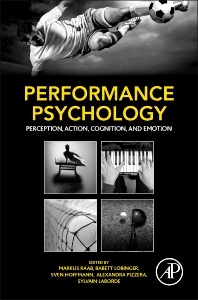Description
Performance Psychology
Perception, Action, Cognition, and Emotion
Coordinators: Raab Markus, Lobinger Babett, Hoffmann Sven, Pizzera Alexandra, Laborde Sylvain
Language: English
Subjects for Performance Psychology:
Keywords
Action monitoring; Action phases; Action space; Action theory; Action�perception coupling; Action; Affective states; Aging; Anticipation; Applied; Attention; Basketball training; Bidirectional link; Body; Brain computer interfaces; Change blindness; Choking under pressure; Coach education; Coaches; Cognition; Cognitive performance; Cognitive training; Cognitive; Cortisol; Creativity; Dance; Decision-making; Dopamine; Dynamic stereotype; Ecological psychology; Elderly; Embodied cognition; Emotion; ERP; Error commission; Error monitoring; Error prediction; Exercise; Expectancy theory; Experimental psychology; Expertise; Focal dystonia; Gaze behavior; Genetics; Inattentional blindness; Individual differences; Information processing; Intention; Leadership; Learning; Lifestyle; Measurement; Mechanism; Mental practice; Mental skills training; Mobility; Motion capture; Motor control; Motor learning; Motor; Movement sound; Movement; Multisensory perception; Music performance anxiety; Music performance; Music; Musician's dystonia; Musicians; Neuro-cognition; Neuroendocrine; Nutrition; Observational learning; Occupation; Paradoxical performance; Parsimonious principle; Peak performance; Perception; Perceptual errors; Perceptual judgments; Performance psychology; Performance science; Performance; Personality traits; Phenomena; Physical training; Postural control; Prefrontal cortex; Pressure; Problem solving; Processes; Psychological interventions; Psychology; Psychometric properties; Psychophysiology; Quiet eye; Reafference; Reentrant processing; Response monitoring; Selective attention; Self-efficacy; Situated action; Sport; Stress; Systems approach; Talent development; Talent selection; The yips; Theory integration; Trait influences
Support: Print on demand
Description
/li>Contents
/li>Biography
/li>Comment
/li>
This book integrates findings from across domains in performance psychology to focus on core research on what influences peak and non-peak performance. The book explores basic and applied research identifying cognition-action interactions, perception-cognition interactions, emotion-cognition interactions, and perception-action interactions. The book explores performance in sports, music, and the arts both for individuals and teams/groups, looking at the influence of cognition, perception, personality, motivation and drive, attention, stress, coaching, and age. This comprehensive work includes contributions from the US, UK, Canada, Germany, and Australia.
Preface
Section A What is Performance Psychology?
1. The Building Blocks of Performance: An Overview Markus Raab
2. Theoretical Framework of Performance Psychology: An Action Theory Perspective Jürgen R. Nitsch and Dieter Hackfort
3. Measurement Considerations in Performance Psychology Gershon Tenenbaum and Edson Filho
4. Applications within Performance Psychology Terry Clark and Aaron Williamon
Section B Performance Phenomena of Cognitive-Action Interaction
5. Bridging the Gap between Action and Cognition: An Overview Babett Helen Lobinger
6. Improving Performance by Means of Action–Cognition Coupling in Athletes and Coaches Gloria B. Solomon
7. Music Performance: Expectations, Failures, and Prevention Eckart Altenmüller and Christos I. Ioannou
8. Motor Imagery and Mental Training in Older Adults Michael Kalicinski, Monika Thomas and Babett Lobinger
Section C Dysfunctional Learning, Errors, and Other Performance Phenomena of Perception-Cognition Interactions
9. Bridging the Gap between Perception and Cognition: An Overview Sven Hoffmann
10. Performance and Error Monitoring: Causes and Consequences Sven Hoffmann
11. Committing Errors as a Consequence of an Adverse Focus of Attention Daniel Schneider
12. Lifestyle and Interventions for Improving Cognitive Performance in Older Adults Patrick D. Gajewski and Michael Falkenstein
Section D Self-Other Perceptions and Other Performance Phenomena of Perception-Action Interactions
13. Bridging the Gap between Perception and Action: An Overview Alexandra Pizzera
14. Capturing Motion for Enhancing Performance: An Embodied Cognition Perspective on Sports and the Performing Arts Vassilis Sevdalis and Clemens Wöllner
15. Auditory Action Perception Christian Kennel and Alexandra Pizzera
16. Visual Perception in Expert Action Rita de Oliveira
Section E Performance under Pressure of Individuals or Teams and Other Performance Phenomena of Emotion-Cognition Interactions
17. Bridging the Gap between Emotion and Cognition: An Overview Sylvain Laborde
18. Performing under Pressure: Influence of Personality- Trait-Like Individual Differences Emma Mosley and Sylvain Laborde
19. The Influence of Hormonal Stress on Performance Franziska Lautenbach and Sylvain Laborde
20. Performing under Pressure: High-Level Cognition in High-Pressure Environments K. Werner
Index
- Integrates research findings found across domains in performance psychology
- Includes research from sports, music, the arts, and other applied settings
- Identifies conflicts between cognition, action, perception, and emotion
- Explores influences on both individual and group/team performance
- Investigates what impacts peak performance and error production




